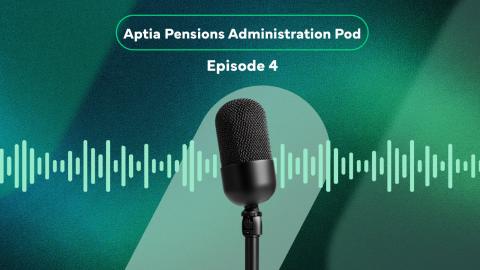Investing in our people’s qualifications is vital for pensions administration

When we founded Aptia as an independent company, we had the opportunity to do things differently and set new standards for pensions administration.
This article is part of our series looking at issues in pensions administration from a leadership perspective.
As the UK’s biggest private sector pensions administrator, we have the scale, resources and duty to invest in our core business of looking after 5 million pension scheme members.
We can bring fresh thinking to the issues and opportunities of pensions administration without competition from other priorities. And the timing is right – we’ve gained this freedom when pensions administration is taking a central role in pensions delivery.
One of the things that excited me about leading Aptia in the UK was the chance to invest in our people. I was increasingly unhappy that as an industry we had moved away from formal qualifications even as pensions have become more complex.
When I joined the pensions industry 35 years ago it was understood that to progress in your career you would take lots of exams. But the industry has gradually turned away from training and education to rely on learning on the job.
From pension essentials to a pioneering qualification
At Aptia we’re bucking this trend by investing in the skills and qualifications of our people across the board – from training in pension scheme fundamentals for new joiners to our pioneering new industry qualification, devised with the Pensions Management Institute (PMI).
If you join Aptia today, you’ll learn about pensions from day one. And your learning path will be mapped out for the next five years or more.
You’ll learn about the technical side of the business – such as how defined benefit and defined contribution schemes work. And you’ll also get training in the essential softer skills – our customer experience module embraces empathy, communication and problem solving.
We also want to empower and acknowledge experienced colleagues who haven’t had their abilities recognised with a formal qualification in recent years. So last year we approached the PMI to collaborate on a qualification for pensions administration that will set a new benchmark for the industry.
As a result, we are looking forward to more than 800 of our Aptia colleagues in the UK and India being recognised through PMI qualifications as we drive to build the most talented teams in the sector.
And if we have the best people, that will feed through to benefit our pension scheme clients and their members. Our colleagues will respond faster, empathise more, go the extra mile and make fewer errors – an unacceptably large source of member dissatisfaction in our industry.
We need skilled, motivated people for today’s challenges
So why are we making this investment now?
Our industry faces an unprecedented array of often interlinked challenges – including regulatory change, cost pressures, an ageing population, rising expectations and embracing the technological revolution.
These pressures are contributing to drive pensions administration to the forefront of pensions delivery. At Aptia, we don’t just do the vital work of paying the right benefits to the right people on time. We also help members and policyholders make life-changing decisions and support them when they need to understand their pension.
And with pensions dashboards, the Consumer Duty, TPR’s general code and consolidation options all adding to the demands on pension schemes, we play a leading role in helping our clients make sure their processes, governance and data are fit for purpose.
To meet these challenges, we need a highly skilled and motivated workforce – and we see professional training as a critical part of what makes an administrator exceptional.
Let’s look at the support we provide to members as our work shifts towards helping members manage their pensions in older age. This means we are helping more vulnerable people – a group that regulators have quite rightly made a priority.
Most of the members we serve now have already retired, and we’ll be looking after many of them into their 80s and beyond – so they’ll need extra help and that personal touch as they get older and potentially more vulnerable.
We’re also helping an increasing number of members’ dependants – and our data shows that 35% of them are aged 80 or over when they first contact us about their loved one’s pension. Understandably, they usually want to talk to a real person with the time and knowledge to help them understand their position.
Technology and people will work together
People have asked me why we’re making this investment when the world is being transformed by artificial intelligence and other technologies that promise to take over tasks from people and do them more cheaply and efficiently.
We set out our position at our spring conference in March: we believe the future is about people and technology working together.
It can be a tricky balancing act. The phrase “silver surfer” emerged around the turn of the millennium, and older people are increasingly living digital lives. Use of smartphones by people aged 65 or over increased from 40% in 2016 to 77% in 2023, according to Ofcom. That’s why we’ve launched our new member app - My Pension @ Aptia.
But at the same time, more than one-third of over 65s still struggle to use the internet and one in six aren’t online at all, Age UK says. And digital exclusion increases with age – today’s online-savvy pensioners are likely to need more human interaction in their 80s or 90s.
Yes, the age of digital pensions administration will be based on automation, robotics and AI. But we don’t think these technologies will displace humans for a sensitive, complex subject like pensions.
Look at Starbucks, which has decided to hire more baristas and rely less on automation. CEO Brian Niccol says the customer experience relies on properly staffed stores with technology in the background. If that’s true for making coffee, it’s definitely true for pensions.
We’re using automation to free our people – not replace them. For example, when a member calls us, our new technology has the ability to gather basic information and start helping them – with no waiting time. And if they want to speak to one of our colleagues, they will get straight to the matter in hand.
That’s better for the member and better for our people, who will focus on the rewarding work of helping the member instead of collecting mundane information.
Winning the battle for talented people
And it’s better for our business. In a labour market that remains tight despite economic uncertainty, pensions administration is in a constant battle to hire and keep the best people. The work of Daniel Pink indicates that employees value autonomy, purpose and mastery at work. That is, they want control over their careers, a sense of working for the greater good and the opportunity to keep improving.
We think a career in pensions administration, structured to offer our people a clear development path with qualifications that recognise their abilities, goes a long way towards fulfilling those goals.
We also know that there’s a knowledge drain in our industry as experienced people retire. We want to fill that knowledge gap – especially for colleagues who have been with us for some years but haven’t taken any qualifications for some time.
And this is part of a bigger picture that affects our prosperity as a nation. The UK has suffered from underinvestment in technology and skills since the financial crisis of 2008. That’s partly why the country has such low productivity, underperforming other major economies such as the US, France and Germany.
Pensions administration has had its own problems when it comes to investment because it has taken a back seat to consulting and other priorities. Without those competing demands, we at Aptia have the opportunity to reverse this decline, making our business more efficient and productive while transforming the service we offer.
Raising the bar for the wider industry
I said at the start that we wanted to raise standards for our industry and set a new benchmark for professional qualifications. I’m serious about this, and we are talking to the PMI about how the qualification can become a model or template for other companies.
With our support, the PMI is consulting other pensions administrators to get their broad buy-in for just that reason. We’re serious about the qualification becoming an industry standard – so it makes sense to get our competitors involved at this stage.
Over the next few years, we’ll be embedding PMI training across Aptia, ensuring that every administrator has access to the best possible professional development.
We’ll also be sharing insights, helping the wider industry understand why investing in training leads to better outcomes. We want this to be a catalyst for change, and to encourage the industry to prioritise professional development in pensions administration.
So watch this space and keep in touch. This is just the start of the journey.
The content provided in our publications, including articles on our website and podcasts, is intended solely for informational purposes. It should not be construed as professional advice and should not be relied upon for any purpose. We strongly recommend seeking appropriate professional advice tailored to your specific circumstances before making any decisions based on this information.



